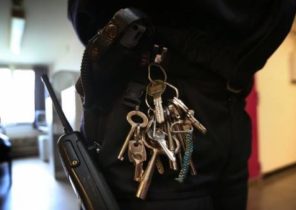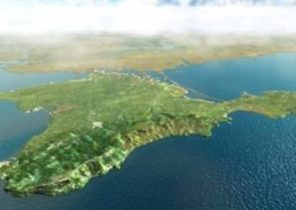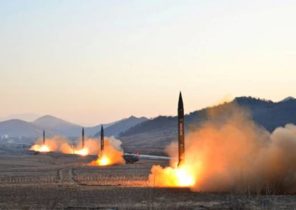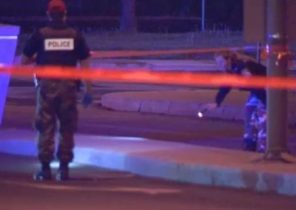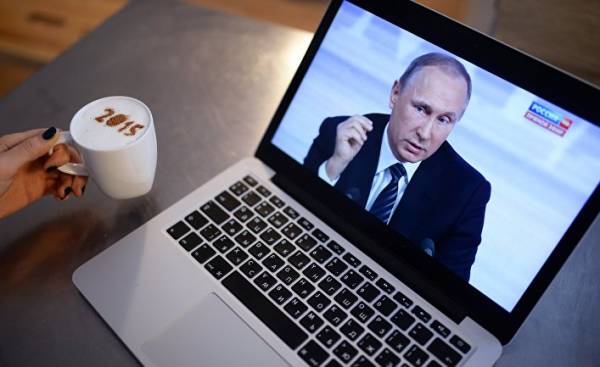
In the first days of 2014 on the Crimean military bases began to appear “green men” irregular paramilitaries. The West assumed that it was Russian soldiers, but could he be sure?
Putin claimed that these mysterious troops are Pro-Russian forces for local defence, the indigenous Ukrainians, who were supporters of the Kremlin. But Mike Mariani explained in a recent article that “the Kremlin has organized a complex political play, to support the annexation”. “This show in Russian is called dramaturgy, theatrical art,” he wrote.
Just a few days later the rebels laid the Foundation for Russia’s invasion and seizure of Crimea. The chaos created by the “green men” has delayed the West’s reaction to the unexpected invasion of Russia, giving the Kremlin an opportunity to gain the upper hand militarily and giving false legitimacy to the referendum in March 2014.
Today during an interview in Saint-Petersburg Vladimir Putin has changed his previous statements, admitting that the Russians would intervene in the US elections in 2016. The Russian President said that cyber attacks may, staged a “Patriotic” Russians. Similarly, he had previously misled about the situation in Crimea.
Hackers, he claimed, “like artists” who choose their targets depending on the mood, “when you Wake up in the morning.” He added that Russian hackers “fight against those who says bad about Russia.”
This response fits the pattern of behavior of Moscow, which is to silence the Russian intervention and “plausible denial” of responsibility of the Kremlin. In Crimea, the Internet and social networks Russian drama tends to mask the overt actions of the government, presenting them as a manifestation of popular nationalism.
In the case of cyber attacks and Internet exposure, the Kremlin uses puppets and agents putting the responsibility of Russia. He mixes facts and fiction and undermines attempts by the West to stop the Russian “active measures”.
Russia has been trying to hide these steps, designed to influence U.S. elections through denial and deception. Whether physical or electronic invasion, the Kremlin confuses the facts to promote their ideas.
Last summer here in The Daily Beast, Andrew Weisberger showed how Russia has created fake news about the terrorist attack on the U.S. air base at Incirlik in Turkey, to affect the audience in the United States. The Kremlin has developed an online equivalent of “little green men”, creating accounts, like pages of ordinary Americans and disseminate information through automated bots to create the effect of large-scale discussions.
Russia in its strategy unites these hidden bots with real people and the media positioned outside of Russia, which produce and promote Russian propaganda. The “grey” group of uncertain origin create the impression of a “national” Russian nationalism in Western countries. A deeper study of these provocateurs and their associations allows us to see a familiar model. This Russian émigrés, trained by the Kremlin, who want to live abroad, but defending Putin. But if they like Russian nationalism, why live abroad?
Critical to “cybercriminality” and to preserve the Kremlin of the ability to deny it are the subjects who perform the job of Russia. As I mentioned during the testimony on the issue of Russian intervention in the Subcommittee on cybersecurity, the Senate, the Kremlin is using “useful idiots” who unwittingly promoted the Russian position and attract “fellow travelers” of like — minded and supporters of Putin’s foreign population to further advance the goals of Russia and strengthening its legitimacy.
These entities in the real world become tools of propaganda that promoted the Russian “cybersunday”. This leads to a growing support for Russia among the population of the United States — in particular, among the alternative right — who unwittingly join in the promotion of Russian views and even cyber attacks.
Ambiguous recognition of Putin fit into the traditional Russian scenario, and recalled the information from the files of Christopher Steele. On the eighth page of this dossier it was reported that exploration during their actions against the campaign, Clinton used the “Russian immigrants and specialists in the field of Internet based in the USA and supported by the state agents working in Russia.”
The Kremlin from the very beginning was preparing for the fact that it can catch, and prepared for this. Russian intelligence provides Putin the way the denial of his role, gaining “green cybertelecom” with the use of contracts or coercion, but by selection and training.
While the NSA develops cyber capabilities by finding, training and supporting talented professionals working under the auspices of the US government, the Russian military intelligence, GRU, is looking for hackers in Russian companies working in the field of cybersecurity, and in the criminal world. Not dressing these people in a military uniform, the Kremlin keeps those hackers and experts in the field of cybersecurity in the civilian world. Contracted agents and criminals are one step away evidence of the involvement of the Kremlin.
No wonder the Obama administration on December 29 last year introduced sanctions against Russian companies Zor Security, known for his joint with the GRU research in the field of security.
Russian intelligence pushes criminals to cyber-attacks as needed and on their own behalf in exchange for freedom from prison. If necessary, it attracts bots as puppets.
President trump, it seems, is the only one who does not believe that Russian — be it the authorities or private individuals hacked into the servers and have influenced elections in the United States. Seventeen intelligence services and the Kremlin agree that Russia, and not China or someone sitting in his basement, broke into the computers of the National Committee of the Democratic party, many other American private databases and mail servers.
The time that Putin chose for his statements, it seems strange. His words sounded the next day after it became known about plans of the President trump to return to Moscow, Russian dacha in the United States. This problem, which the Obama administration took in response to the Kremlin’s meddling in the election. Whether Putin is trying to help the Tramp out of the scandal? Or maybe he takes responsibility for the impact on American voters?
Now in the United States conducted three investigations of Russian interference in the election, but in the coming months, their number will only increase. Putin seems to be trying to influence the situation from outside. It focused its comments on the reduction of tension? Or on the contrary, they aimed at further promotion of the “active measures” to fuel conflict in US politics? We don’t know what he’ll do. But you can be pretty sure that the plan he has. Unlike America at the Kremlin, he is always there.

